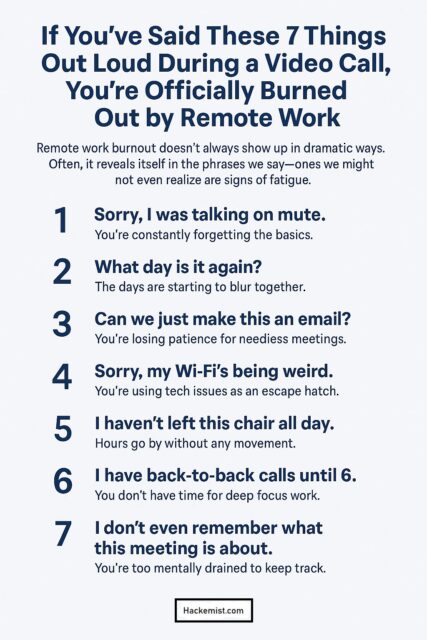When remote work first became a widespread norm, it felt like a dream for many: no commute, sweatpants as work attire, the joy of making your own coffee instead of depending on the questionable office Keurig.
But five years in—and a few thousand Zoom calls later—it’s clear that the dream has a dark side.
What started as freedom has morphed into fatigue. The kind that creeps up slowly until you find yourself sighing into your webcam and saying things like: “Can everyone see my screen?”—even though you stopped caring 20 meetings ago.
Remote work burnout isn’t always dramatic. It’s not always about snapping at coworkers or quitting in a blaze of glory. Sometimes, it shows up quietly, in the things we say without realizing we’re revealing just how tired we are.
So if you’ve uttered any of the following seven phrases out loud during a video call, you might be more burned out than you think.
Let’s walk through them—and what they really say about the state of your mind.

1. “Sorry, I was talking on mute.”
It seems innocent enough, right? It’s a classic video call blunder. But if you’re doing this multiple times a week—or worse, multiple times a day—it might not just be about the mute button.
It might be about your brain fog.
Remote burnout isn’t always about being physically exhausted. Sometimes it’s about cognitive fatigue. The kind that makes your attention scatter, your short-term memory go fuzzy, and your basic functions (like unmuting before speaking) fail you.
If you’re constantly forgetting simple things on calls, it’s probably not just the tech. It’s your brain saying: “I’m tired of multitasking, of context switching, of being ‘on’ all the time.”
2. “What day is it again?”
Listen, we’ve all had that moment. You look at your calendar and realize it’s Wednesday when your body swore it was Friday. But if this confusion is happening regularly, you’re probably experiencing what researchers have started calling “temporal disorientation.”
Yes, that’s a real thing.
Remote work often flattens time. Without the clear markers of getting dressed, commuting, grabbing lunch with coworkers, or walking out of the office, our days start blending together. Work hours leak into evenings. Weekdays blur into weekends.
When you ask, “What day is it again?” out loud on a call, it’s often a small sign of a larger truth: you’ve lost your rhythm.
And rhythm, as it turns out, is vital to mental clarity and emotional stability.
3. “Can we just make this an email?”
There’s a lot of debate over unnecessary meetings—and for good reason.
But when this phrase escapes your lips in the middle of yet another video call, it says more than just “I’m efficient.”
It often says: “I have too much on my plate, not enough time to breathe, and I’m losing patience for meetings that don’t serve a purpose.”
That irritability? That eye roll when someone opens a slideshow you didn’t ask for? That’s decision fatigue mixed with attention fatigue.
You’re not just tired of meetings. You’re tired of pretending to be engaged in meetings that don’t need to happen.
That tension builds. It drains you more than you think.
4. “Sorry, my Wi-Fi’s being weird.”
Let’s be honest: sometimes it’s not the Wi-Fi.
Sometimes it’s a convenient exit from a conversation we no longer have the emotional energy to participate in. Sometimes it’s code for “I need a break, and I don’t know how to say that without sounding unprofessional.”
When we start using our internet connection as a buffer—or a shield—we’re often masking the deeper burnout underneath.
It’s like your brain found the adult version of pulling the fire alarm to skip class.
And if you’re reaching for the “bad Wi-Fi” card more than once in a while, it might be time to ask: what am I actually avoiding?
5. “I haven’t left this chair all day.”
It’s funny when someone says it with a laugh during a 4 p.m. call. But behind the chuckle is something more serious.
Because if you haven’t left your chair all day, you also probably haven’t:
- Eaten a real meal
- Moved your body
- Stepped outside
- Taken a moment to breathe without multitasking
That’s not just a sedentary lifestyle. That’s work-life collapse.
When your office is your kitchen table and your breakroom is your own couch, it becomes dangerously easy to skip boundaries altogether.
And burnout thrives where boundaries are absent.
6. “I have back-to-back calls until 6.”
Let me guess: none of them include actual focus time. And by the time 6 p.m. rolls around, your energy is gone, your brain is mush, and you still haven’t done the work that matters most.
That constant “on” mode? That back-to-back calendar gridlock? That’s a breeding ground for Zoom fatigue, but it’s also a symptom of a deeper issue: the erosion of deep work.
We’re not just overwhelmed—we’re underfulfilled. We’re ticking boxes without making progress. We’re attending, but not contributing. Present, but numb.
And when that becomes the norm, burnout doesn’t knock. It walks in and makes itself at home.
7. “I don’t even remember what this meeting is about.”
This one cuts deep.
Because it’s not just a scheduling fail—it’s a sign you’re mentally checked out.
When your brain is so overrun with inputs that you can’t even remember why you’re in a room (virtual or not), that’s not just forgetfulness. That’s mental overload.
And it’s not sustainable.
What burnout sounds like in remote work
These seven phrases might seem harmless on the surface, but together they paint a picture: disconnection, fatigue, loss of focus, boundary erosion, and a slow, steady depletion of your emotional and cognitive reserves.
This is what burnout sounds like in a remote world.
And it doesn’t mean you’re weak. It means you’re human.
Because while remote work gave us flexibility, it also removed many of the natural buffers that used to protect our mental health—commutes, lunch breaks, walking to a coworker’s desk instead of pinging them five times.
We’re living in a world where being “reachable” often means being exhausted.
So what can you do?
If you recognized yourself in more than a couple of these phrases, that’s not a failure. That’s feedback.
Here are a few small but powerful shifts to start rebuilding your energy:
- Reclaim your start and stop times. Shut the laptop. Don’t reopen it. The work can wait.
- Build transitions into your day. A walk between meetings. A song between tasks. A stretch before you start typing.
- Say no to non-essential meetings. If you wouldn’t walk across the office for it, it probably doesn’t need to be a Zoom call.
- Take a real lunch break. No screens. No emails. Just food and a quiet moment to yourself.
- Create “deep work” hours. Block your calendar. Protect your focus. You deserve to create, not just respond.
Final thought
Remote work isn’t going anywhere. And neither is burnout—unless we start naming it, seeing it, and changing how we respond to it.
The next time you hear yourself say one of these phrases, pause. Take a breath. And ask yourself, What do I need right now that I’ve been ignoring?
Because chances are, it’s not a better Wi-Fi signal.
It’s rest. It’s clarity. It’s you—coming back to yourself.
